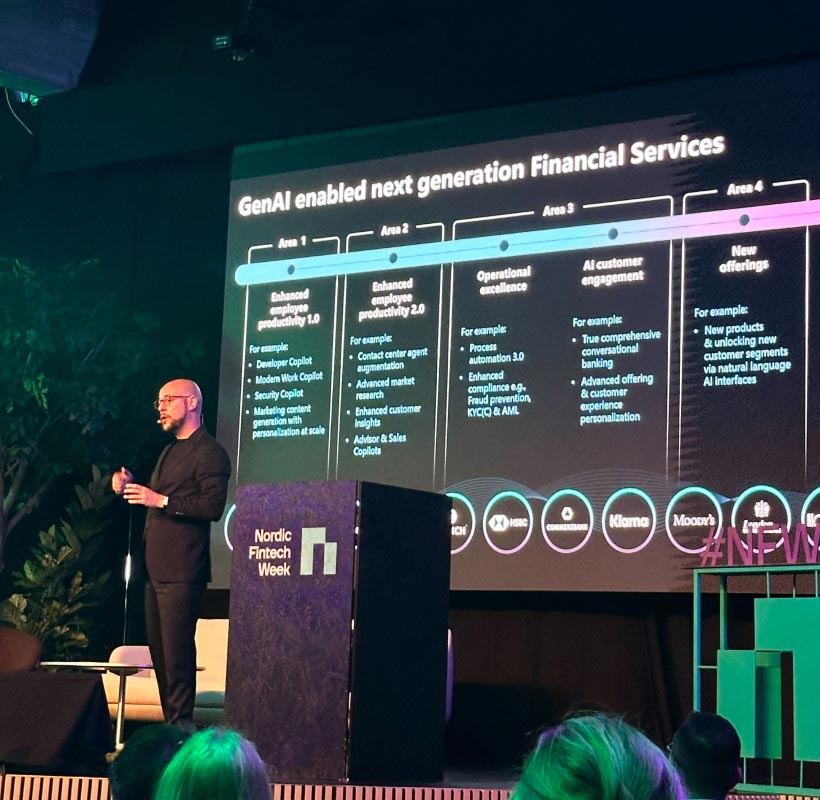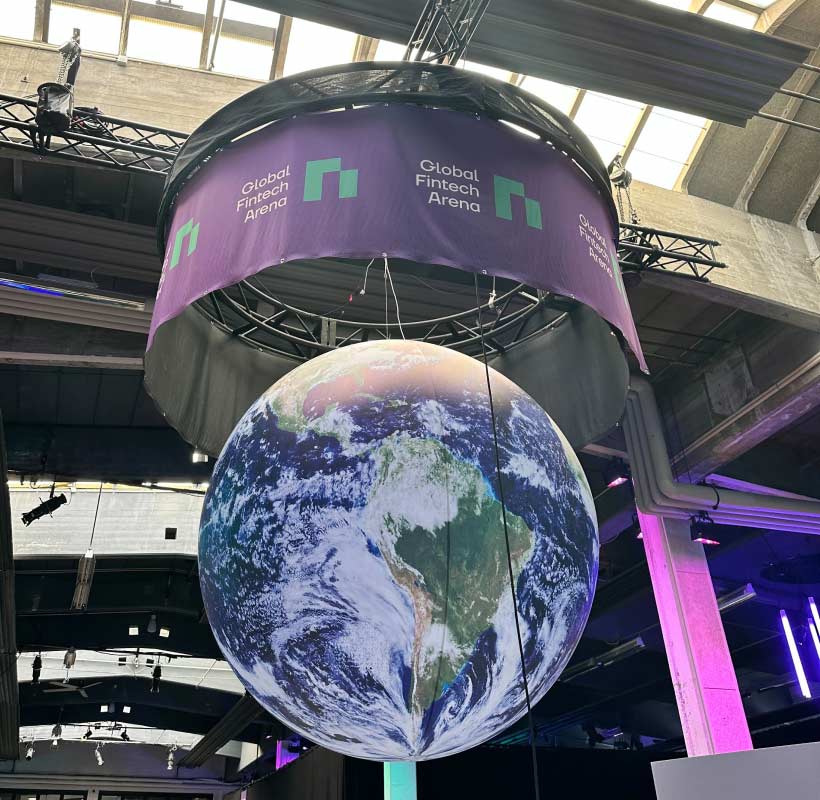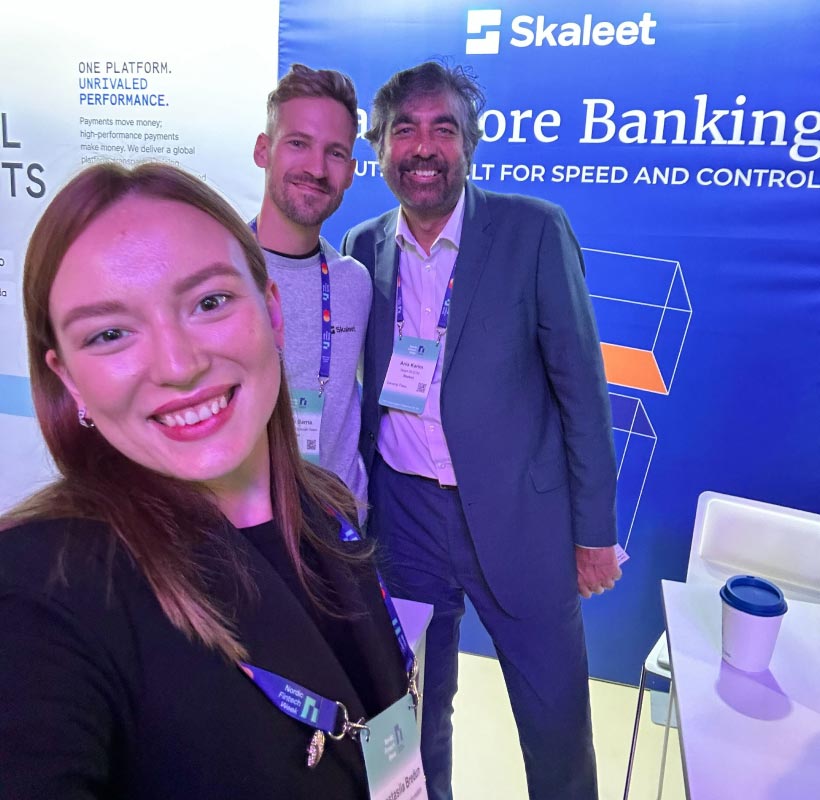For Light IT Global September has ended on a high note, as we took part in one of the most influential and anticipated conferences of the year—Nordic Fintech Week 2024.
Our VP of Digital Transformation and Fintech Innovation Expert, Anastasiia Bredun, gathered some of the most prominent insights from this event, and we’re happy to share those in this article!
Rapid AI Evolution Shifts Cybersecurity Paradigm in the Financial Sector
Discussing AI's benefits and life-changing perspectives is expected in the global IT community, especially during tech-optimistic events like Nordic Fintech Week. So, not facing away from the difficulties that AI adoption inevitably brings is even more valuable.

This year’s conference highlighted several challenges Fintech business owners must consider today.
One is the need to withstand the outbreak of cybercrimes and identity theft fueled by deepfakes and AI-powered cybercrime tools. As chairman of the board at Concordium, Lars Seier Christensen mentioned during his presentation we’d entered an era where we can no longer trust any data that hasn’t been verified, even if it is from a trusted source because even the most convincing pieces of information and even identities can now be AI-generated. And that’s something that enhances the importance of well-rounded cybersecurity measures and zero trust approach in Fintech.
On the one hand, new solutions emerge, helping businesses take care of AI provenance and verify the information through digital verifiable credentials stored on Blockchain. The first steps towards building a much-needed “identity level” have already been taken (e.g., a European Identity Wallet that will be the holder of verifiable credentials).
On the other hand, even the most promising tech innovations cannot be effective without a clear governance framework that should include not only tech partnerships but AI strategy and policy. There’s also a need to adapt the legislation accordingly, bringing it in balance with the technological landscape.
Financial Data Access Framework as a Cornerstone of Open Data Economy
European Financial Data Access (FiDA) regulation and its influence on how we perceive open banking was one of the most interesting topics during the conference.
According to the speakers, particularly Lauren Jones, a strategic partner at Raidiam, FiDA can unlock the open data economy beyond open banking and even open finance, spanning different sectors, including healthcare, communications, energy, etc.
In a nutshell, FiDA secures the ability to share financial data across the European Economic Area and empowers individuals to take control of their data while ensuring transparency and providing a holistic view of their financial situation across various domains.

For businesses operating in the finance and banking sector, this means having more opportunities for customer interaction, more data from which to derive insights, and more new business models like embedded finance.
Easier access to data within an Open Data Economy may also facilitate the risk assessment process as it provides a broader view of an individual’s financial situation and helps to make more well-informed balanced decisions.
Still, FiDA presents quite a few challenges that businesses will be forced to face. Just to name a few, it’s cybersecurity and data protection, costly adaptation to new requirements, a stronger focus on technology adoption necessary for smooth data sharing and exchange, the need to form partnerships within financial and insurance sectors as well as beyond that.
While the regulatory timeline is uncertain, the transition to Open Finance is already happening. For sure, many businesses will be left behind, unable or unwilling to embrace innovation and undergo the digital transformation that goes with that. But even today, multiple companies choose a proactive approach to Open Finance adoption and open data usage to shape the next-gen view of financial services.
Conversational AI Alters the Way Businesses and Customers Communicate
Another AI-related topic discussed during Nordic Fintech Week we cannot leave behind is the influence of conversational AI on finance and banking.
While using AI-based tools like chatbots and virtual assistants is nothing new, speakers at the conference shared their experience with conversational AI adoption, which is extremely insightful.

Firstly, incorporating AI-powered instruments didn’t lead to job displacement in customer service. As a matter of fact, it increased productivity due to automation and even improved employees’ satisfaction as they are freed from repetitive mundane tasks.
Secondly, conversational AI is now used not only externally (to interact with customers) but internally as well (to help agents to perform their duties in a more efficient manner). As a result, companies that have focused on conversational AI adoption experience ROI boost.
Lastly, conversational AI in finance today is an area with high maturity, but businesses that overlooked its potential are now forced to compensate with larger investments in AI adoption. This proves that artificial intelligence is becoming an integral part of the customer experience in finance and banking and won’t be going anywhere.
Strategic Partnership Is a Major Growth Driver
The last insight we’d like to share in this article is not as tech-focused as the previous ones but is as important. Several panels on this year’s Nordic Fintech Week revolved around the vital role of forming strong partnerships between major Finance and Banking players, SMEs, and tech providers.

As no financial institution or business can “do it all” on their own, the digital transformation process is essentially impossible without cooperation with FIntech startups and IT vendors. Yet, by building a robust partnership network, finance and banking market players can maintain a competitive edge and drive innovation.
SMEs, in turn, get access to a wider variety of tools and resources that allow them to thrive in a competitive and ever-evolving Fintech landscape. Some concrete examples include easier access to funding and more modern financial tools.
As a result, forging partnerships is a win-win approach for every market player: larger institutions become more flexible, competitive, and attractive for the customers, and smaller companies/startups get more growth opportunities, driving innovation forward.
Final Words
Nordic Fintech Week 2024 was an amazing experience for Light IT Global. We’ve not only dived into the hottest topics that will shape the industry's future but also met great people who value innovation, creative ideas, and cooperation as much as we do.
If any of the matters described in this article seem interesting to you, don’t hesitate to reach out to us! With 17+ years of experience in Fintech and over 400 projects under our belt, we’re always ready to help businesses looking for a reliable custom software development vendor.




